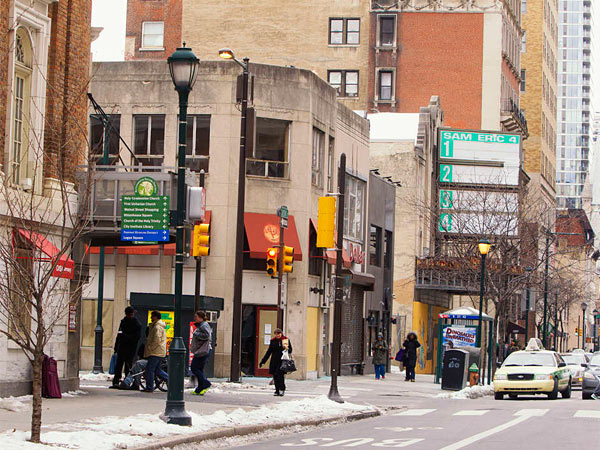Philadelphia's historic Boyd Theater is a building that
seems to have nine lives, so its near-death experience this week may appear to
be just another nail-biting moment in the perennial saga. It is not. This time,
the gorgeous art deco movie palace - the city's lone survivor from Hollywood's
heyday - looks done for good.
It's true that the Historical Commission's subcommittee on
financial hardship did not rule Tuesday on a petition from the Florida-based
movie chain iPic, which wants to replace the Jazz Age auditorium with eight
modern screening rooms. That decision was put off until the full commission
meets Feb. 14. But the Boyd's fate is such a foregone conclusion that another
subcommittee went ahead and reviewed iPic's architectural designs anyway.
Preparing for the showdown, the commission did a sensible
thing and brought in a consultant to evaluate iPic's plan to gut the theater at
19th and Chestnut Streets. Unfortunately, it came with the
preservation-averse-sounding name of Real Estate Strategies, and used its
10-page report to tell us what we already knew: The 1920s building can't be
saved unless it gets a big public subsidy. For just a buck, the commission
could have bought the Nov. 22 Inquirer and read the same thing in my column.
The belief that the Boyd has to be destroyed to be saved has
gained traction with several high-profile groups that had once stood by the
theater. Both the Center City Residents Association and Sharon Pinkenson's
Greater Philadelphia Film Office have endorsed iPic's plan. Seduced by the
possibility of a first-run movie house in the heart of Center City, they have
concluded it's now worth sacrificing the Boyd's most distinctive feature - its
rippling, multicolored auditorium.
What they forget is that there is a reason this high-rent
district has no multiplexes. Land is too valuable now for a single-use, big-box
commercial building to be profitable. IPic can afford the huge site only
because the Boyd's owner is willing to dump it for $4.5 million, half of what
it paid seven years ago. By coincidence, another operator, Ray Murray of
Theater of the Living Arts, unveiled a concept almost identical to iPic's on
Tuesday. But his lounge-style movie house would occupy an old warehouse on
Sixth Street, in the empty zone north of Vine Street - a far more affordable
spot.
As part of the iPic debate, some have argued that the Boyd
has become a blight since it was shuttered in 2002, dragging down the west end
of Chestnut Street.
So, how to explain the retail revival that has happened
there despite the presence of the Boyd's plywood-covered facade? There has been
a rush of high-end clothing stores, including Joan Shepp, Knit Wit, and
Nordstrom Rack, which is taking over the Daffy's building at 17th Street,
largely because rents are soaring on Walnut Street.
Long the sick man of Philadelphia, Chestnut Street is
experiencing a frenzy of new construction. How the Historical Commission treats
the Boyd's landmark status will have implications for the rest of Chestnut
Street, the only Center City commercial corridor that remains a parade of
narrow, architecturally diverse buildings.
"Few cities retain such variety," noted a 2005
report by students in Penn's historic preservation graduate program, who spent
a semester mapping its treasures. The street contains a museum-worthy
collection of architectural greats: Furness, Windrim, Cret, Trumbauer, Hale,
Burnham.
But how long Chestnut can retain its eclectic spirit is
unclear. Far too few buildings have landmark protection.
Indeed, the Boyd isn't the only notable building on the 1900
block facing demolition. It's possible that everything to the east could soon
be leveled, including a landmarked art deco commercial building on the corner.
According to HughE Dillon, who blogs as PhillyChitChat,
Pearl Properties (which just completed an admirably urban apartment house on
the 1600 block of Sansom) is planning a high-rise tower between the Boyd and
19th Street. It's not clear if Pearl will incorporate the historic corner
building - or follow iPic's lead and seek financial-hardship clearance to
demolish it. The company's head, Jim Pearlstein, did not respond to requests
for details.
While the two-story corner building is hardly on the level
of the Boyd, it is one of those vernacular early-20th-century relics that
conjures up the heady days when Chestnut Street was the center of the region's
commerce. Done right, a tower could be a boon for the area. But it would be a
terrible precedent to allow the corner to be obliterated under the hardship
law, because it has proven itself most recently as a Qdoba restaurant with
second-floor offices.
There's no doubt that residential projects are a big reason
the street is making a comeback. Just this month, Brickstone started
construction on an 80-unit apartment house on the 1100 block, a stretch that
truly qualifies as blighted. It's a fine project that combines preservation of
an existing building and infill construction.
All this residential activity elsewhere should cause the
Historical Commission to question the merits of iPic's plan. To devote a site
as big as the Boyd's to a single-story use makes no sense in today's red-hot
market. But putting an apartment tower on the roof of the theater - first
proposed in 2004 - does. Most of New York's new multiplexes are embedded in the
base of high-rise towers. This approach would provide the financial return
necessary to really save the Boyd.
In the decade since the art deco theater went dark, dozens
of downtown movie palaces have been brought back to life in other cities. But
not one has been resurrected without government money and - more crucially -
government commitment.
Sadly, Philadelphia's leaders have not been able to muster
either. They've also increasingly taken the view that historic buildings must
prove themselves as moneymakers. How does the Boyd Apartments sound?
Source: Philly.com

No comments:
Post a Comment